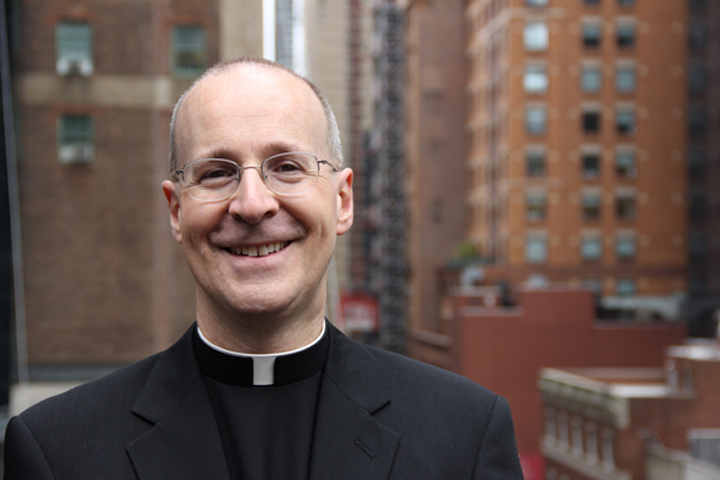
The Rev. James Martin, author and Catholic priest. (DeChant-Hughes & Assoc Inc Public Relations)
If you haven't read one of Fr. James Martin's many books, or seen him as chaplain for "The Colbert Report," you've probably seen him on one of the major networks that regularly brings him on as an expert. He is one of the most important religious voices in the country, but I've found him an even more important voice when it is time to be quiet. Here is our conversation about Christianity's most holy of weeks.
So, here we are in the midst of another Holy Week. Especially for lifelong Christians, our human side can sometimes make it hard to do something other than go through the motions. Any advice about how to renew ourselves spiritually as we come down the homestretch before Easter?
Remind yourself that God is always willing to do something new in you, if you are open to it. In other words, just because you think that all you can do is "go through the motions," God may have something else in mind. So now that you're in the homestretch, why not spend a little more time in prayer, a little more time with the daily Scripture readings, and a little more time being kind to people? All you can do is be open to God. But once you're open, God will act, in often surprising ways. In short: be open, be ready for surprises, and, above all, notice.
You've written several wonderful books: "The Jesuit Guide to (Almost) Everything" (which I use with my Fordham freshmen), a book about laughter, humor and the spiritual life, and several others. But you have a new book out now titled "Seven Last Words: An Invitation to Deeper Friendship with Jesus." What is this one about?
It's a meditation on the "Seven Last Words," that is, the seven last phrases that Jesus utters on the cross -- at least as recorded in the Gospels. (There might have been more that went unrecorded.) The book flows out of a series of meditations I did last year at St. Patrick's Cathedral in New York on Good Friday, at the invitation of Cardinal (Timothy) Dolan. Such Seven Last Words services are pretty common in both Catholic and Protestant circles. And in these sayings of Jesus, we are offered a privileged access into his inner life. So they are incredibly important for the Christian spiritual life.
Especially because you have focused on the joy of the spiritual life in other books, it is interesting that you focus so much on Jesus having negative experiences -- everything from thirst to the experience of being abandoned by God. Why focus on these negative experiences of Jesus?
The book looks at the experiences of Jesus on Good Friday. Now, of course, Jesus lived a largely joyful life. In fact, I think the traditional Catholic emphasis on Jesus as the "Man of Sorrows" is a little misplaced. For Jesus was much more the "Man of Joys," bringing healing to the sick, preaching the good news to the poor, welcoming the marginalized into the community, and on and on. These are all joyful actions. But on Good Friday, his life moves into darker territory, to say the least. And these final words on the cross provide us with a real window into Jesus' humanity. The more you meditate on the seven last words, the more you realize that the Son of God struggled with all that we do — physical, emotional, and even spiritual suffering. It's an entree for us into Jesus' life, and an entree for him into ours.
The subtitle of your book refers to friendship with Jesus. This is one of the most astonishing things about what Christians believe -- that we can actually have a friendship with God. Can you say more about this and how your book asks us to think about it?
The concept of friendship with God is something that I was introduced to as a Jesuit novice. And it's true: God desires our friendship. More basically, God wants to be in relationship with us. In fact, that's one of the overarching themes of both the Old and New Testaments. And what kind of friend do we have in Jesus? We have someone who went through all that we do. Therefore, we have someone who understands us, and someone with whom we can feel comfortable. The Seven Last Words reminds us that Jesus understands us not simply because he's the fully divine Son of God who knows all these things, but because he is fully human and experienced all these things. Basically, he gets us. He gets you. This insight can help people really open up and be honest with Jesus in prayer. And that openness is the foundation of friendship.
This book just came out, but if I know James Martin, he likely has something exciting in the hopper. What's next?
I hope it's exciting! But I guess I'll have to leave that up for readers to decide. My next book is going to be an introduction to prayer called, perhaps not surprisingly, "How to Pray." I'm really enjoying writing it. After that, God willing, I hope to write an extended meditation on the raising of Lazarus. And then, again God willing, a fictional memoir of the Apostle Nathanael. I really enjoy writing, but I know it all depends on God. So, as I say, God willing!